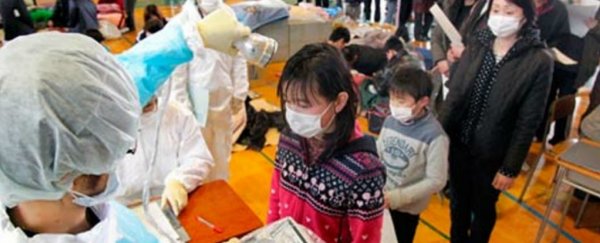Researchers have found that children living near the 2011 Fukushima nuclear meltdowns are significantly more likely to be diagnosed with thyroid cancer, with diagnoses being made at a rate of up to 50 times that of children living elsewhere in Japan.
As The Associated Press reports, the majority of the 370,000 children living in the Fukushima prefecture have undergone regular testing since the meltdowns, and a new study has found that 137 of them have either been diagnosed with, or are showing signs of having thyroid cancer. This is 25 more children than were diagnosed last year, and a vastly different rate from what's seen in the rest of the country, which has an estimated average of one or two in every 1 million children diagnosed each year.
"This is more than expected and emerging faster than expected," said lead researcher Toshihide Tsuda from Okayama University. "This is 20 times to 50 times what would be normally expected."
Thyroid cancer has been linked to nuclear radiation in the past, with the World Health Organisation (WHO) reporting "a large increase in the incidence of thyroid cancer" in people who were young children and adolescents at the time of the 1986 Chernobyl meltdown in the most contaminated areas of Belarus, the Russian Federation, and Ukraine.
The reason children and teenagers are at a higher risk of developing thyroid cancer following a nuclear meltdown event is because the thyroid gland needs iodine to produce hormones that are responsible for regulating our metabolism. It actively absorbs any iodine in the bloodstream, and it doesn't distinguish between regular - or 'stable' - iodine, and the radioactive iodine that's released by a meltdown.
In children and adolescents, the thyroid gland grows much quicker than when we're adults, which makes the thyroid one of the most radiation-sensitive parts of the body for young people. Radioactive iodine, known as 131I, is also particularly dangerous to unborn children, the WHO reports:
"Similar to stable iodine, 131I is actively taken up by the thyroid gland. The foetal thyroid gland concentrates iodine by 11-12 weeks' gestation, so if radioactive iodine enters the mother's blood stream after that period it can be taken up also by the foetal thyroid gland."
But even knowing this, it's still very difficult to directly link radiation and cancer, with The Associated Press saying it's "scientifically impossible to link an individual cancer case to radiation". One of the biggest problems in linking the two is when you start having regular and intense screening programs for people in the vicinity of a nuclear meltdown, you get what's known as the 'screening effect'.
The screening effect occurs when it looks like people in a particular area are being diagnosed with more cancer because they're being screened more often than people in the rest of the country. This is the line the local federal government has been using in Japan, and the lead doctor in charge of assessing the effects of Fukushima, Shunichi Yamashita, has repeatedly ruled out a link between thyroid cancer instances and the meltdown event.
But in the recent study, published in the journal Epidemiology, Tsuda and his colleagues say that not only has childhood thyroid cancer been definitely linked to radiation following Chernobyl, they argue there's more to this increased rate of diagnosis than the screening effect, noting that it's not a case of mandatory screening picking up on early cases in the Fukushima kids that would go unnoticed elsewhere. They write:
"[T]he magnitude of the incidence rate ratios (IRRs) was too large to be explained only by this bias. Furthermore, according to the data reported by Fukushima Prefecture, positive lymph node metastases were observed in 40 of 54 cases (74 percent) operated at the Fukushima Medical University Hospital. This finding indicates that cancers detected by screening were not at a particularly early stage."
While a number of independent experts have criticised Tsuda's study for its lack of individual estimates on radiation doses, which makes the case for a definitive causal link impossible, they say the results of the study are enough to warrant further investigation.
"Tsuda's study had limitations including assessment of individual radiation dose levels to the thyroid and the ability to fully assess the impact of screening on the excess cases detected," Andrew F. Olshan, professor at the Department of Epidemiology at the University of North Carolina in the US told The Associated Press. "Nonetheless, this study is critical to initiate additional investigations of possible health effects, for governmental planning, and increasing public awareness."
